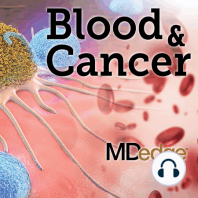34 min listen

NCI-MATCH trial reveals actionable mutations and matches cancer patients to targeted therapies
FromBlood & Cancer
NCI-MATCH trial reveals actionable mutations and matches cancer patients to targeted therapies
FromBlood & Cancer
ratings:
Length:
20 minutes
Released:
Feb 11, 2021
Format:
Podcast episode
Description
The NCI-MATCH trial was designed to reveal mutations in underexplored cancer types, allowing researchers to match patients to appropriate targeted therapies. Study investigator Alice P. Chen, MD, from the National Cancer Institute, reviews the goals and results of NCI-MATCH with host David H. Henry, MD, in this episode. Trial details NCI-MATCH has more than 1,000 participating sites. The trial is open to patients with advanced cancers that have progressed on standard treatment or rare cancers for which there is no standard treatment. Investigators use next-generation sequencing to identify mutations in tumor biopsies taken before the start of therapy. Sequencing is performed at MD Anderson Cancer Center, Houston; Massachusetts General Hospital, Boston; MoCha at NCI’s Frederick (Md.) National Lab; Yale University, New Haven, Conn.; and commercial labs. Matching patients to treatment When a patient is found to have an actionable mutation, that patient is assigned to an investigational treatment, typically monotherapy. A patient cannot be assigned to a treatment that is already known to be effective against their cancer; for example, patients with BRAF-mutated melanoma were excluded. The NCI’s Cancer Therapy Evaluation Program sends the patient's targeted therapy to the participating site within 24 hours of notification. CT imaging is done prior to the start of treatment, and patients are monitored with repeat scans every two cycles. Results Data on 5,954 patients with refractory malignancies were recently reported (J Clin Oncol. 2020 Nov 20;38[33]:3883-94). About 38% of those patients had an actionable mutation, and about 18% were assigned to a targeted therapy. Reports have shown varying response rates to matched therapy, ranging from 2% to 38%, Dr. Chen said. Results from the trial's treatment arms can be found here: https://ecog-acrin.org/nci-match-eay131-findings. Dr. Chen noted that this trial was designed to match patients with single agents. Combination therapy has only been used in one arm of the study (J Clin Oncol. 2020 Aug 06. doi: 10.1200/JCO.20.00762). Future directions Nine treatment arms are still open, and one arm has yet to open. Conclusions are still pending the completion of the treatment arms. The next step for this research is expanding to include more combination therapies. There is also interest in comparing biopsies of tissue obtained at initial diagnosis and after treatment to further improve understanding of mutations. For more information on NCI-MATCH, visit: https://www.cancer.gov/about-cancer/treatment/clinical-trials/nci-supported/nci-match. https://www.cancer.gov/about-cancer/treatment/clinical-trials/search/v?id=NCT02465060. Show notes written by Sheila DeYoung, DO, a resident at Pennsylvania Hospital, Philadelphia. Disclosures Dr. Chen and Dr. Henry have no conflicts of interest. * * * For more MDedge Podcasts, go to www.mdedge.com/podcasts Email the show: podcasts@mdedge.com Interact with us on Twitter: @MDedgehemonc David Henry on Twitter: @davidhenrymd
Released:
Feb 11, 2021
Format:
Podcast episode
Titles in the series (100)
COVID-19 and lung cancer: The decision to delay treatment: In the “new normal” of treating cancer patients during COVID-19, when do you decide to start treatment or pause it? Narjust Duma, MD, a thoracic oncologist at the University of Wisconsin, Madison, shares how she makes those decisions in... by Blood & Cancer